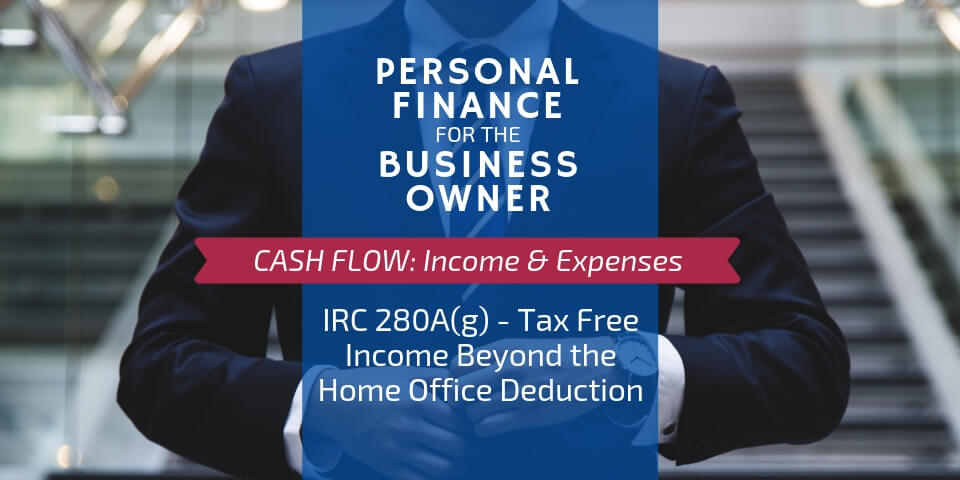
3 Investing Apps – This Financial Planner’s Favorites
May 7, 2019
Hiring Your Special Needs Child – A Unique Employee with Unique Benefits
May 15, 2019IRC 280A(g) – How You Could Use Your Home to Create Tax-Free Income

Can you imagine taking money out of one of your pockets, deducting it as a business expense, and then putting it back in your other pocket tax-free? That’s pretty crazy, right? What if it were legal? Actually, this tax strategy is so common that the IRS issued a private letter ruling on the matter. So what is this tax gem I’m talking about? You can rent your home to your business for business meetings! This even goes beyond the standard home office deduction found in the IRC 280A tax code. Let me explain how the “14-day rental rule” can work for you.
Podcast Time Index for “Can I Really Rent My House to My Business Using 280A?:
- 01:42 – Can I Really Rent My House to My Business?
- 02:42 – It’s Bristol, Baby!
- 03:52 – Business Rental
- 06:42 – The Business Nexus
- 08:05 – A Few Misunderstandings
- 08:07 – Deductions for Renting
- 09:35 – Deductions for Entertainment Facilities
- 10:15 – Can’t Deduct Rental for a Related-Party
- 10:41 – Can’t Deduct Personal, Family, or Living Expenses
- 11:16 – Prove it’s an Ordinary and Necessary Business Expense
- 12:17 – The Substance Over Form Doctrine
- 12:57 – How to Do This Properly
Please note that the information in this article is not tax advice. I am merely giving you information about tax strategies you might employ. This information does not take the place of advice from your personal tax advisor or planner. If you think the strategy in this article applies to you, contact your financial planner, CPA, or tax advisor.
You Need Space for Business Meetings
Let’s start with the assumption that you are a business owner and that you have a legitimate business. Let’s also assume that you need to rent some space outside of your office for board meetings, shareholder meetings, strategic planning meetings, tax planning meetings, or other legitimate business meetings. Normally, you would contact a local restaurant, hotel, office suite, or event center that offers a board room, audiovisual equipment, WiFi, meals, drinks, and refreshments. You would then rent the space and deduct the business expenses from your tax liabilities. That’s pretty amazing, right? You can go rent a space and get a deduction.
Now, whenever you rent the space from a restaurant, hotel, office suite, or event center, not only are you getting a tax deduction, you are generating income to that other business, perhaps in the form of rental income. That only makes sense. Yet, let’s say that instead of renting rooms in an event center, you rent rooms in your home. You see, you have WiFi and audiovisual equipment (computers, laptops, TVs, phones, etc.) in your house. You have drinks, food, tables, and chairs. Essentially, you have all the things an event center would have. So, why not rent your home to your business and get BOTH the expense deduction AND the rental income?
IRC 280A(g) Tax Code – The “14 Day Rental Rule”
However, what does the IRS have to say about renting your home to your business? Well, Section 280A of the Internal Revenue Code allows you to use your home as an office. That’s fairly common knowledge. By having a home office, you receive a tax deduction. However, what I’m talking about goes beyond that standard home office tax deduction. I’m talking about renting your home to your business for meetings, not using your home as your office.
Section 280A(g), specifically, expands upon the rules of renting your home to your business. The code says, “If a dwelling unit is used during the taxable year by the taxpayer as a residence and such dwelling unit is actually rented for less than 15 days during the taxable year, then- (1) no deduction otherwise allowable under this chapter because of the rental use of such dwelling unit shall be allowed, and (2) the income derived from such use for the taxable year shall not be included in the gross income of such taxpayer under section 61.”
Interpreting IRC Section 280A(g)
Okay, so what does that mean?
The Deduction
Section 280A(g)(1) means that you cannot deduct the expenses from your personal taxes. Even though you can’t claim the expenses on your personal taxes, your business can claim the expenses, and if you own an S Corporation, a Sole Proprietorship, or an LLC taxed as an S Corporation, then your business tax deductions “pass-through” to your personal taxes.
The Income
Section 280A(g)(2) goes on to specify that the rental income you personally earn is tax-free IF you rent your home to your business for less than 15 days during the taxable year! Therefore, as long as your business rents your dwelling for 14 days or less each year, none of the income you earn for renting your home to your business is taxable. Thus, not only does your business receive tax deductions for ordinary business expenses, you receive tax-free income!
Just how does this work? How do you use this provision properly and legally?
How to Rent Your Home to Your Business
- First, schedule your monthly board meetings or monthly business planning meetings to happen at your house. Go ahead and do that. Put it on your business’s calendar. Just make sure you schedule 14 or fewer meetings at your house.
- Second, take corporate minutes at the meetings. The IRS wants you to record corporate meeting minutes, and if you’re holding corporate meetings as you should be, take down the meeting minutes.
- Then, go out and get comparables. Go to a hotel, a country club, a restaurant, or anywhere you would rent a board room for a day or a half a day. What would that location charge you for space, the A/V equipment, the refreshments, and the food for the day? Whatever their fee is, charge that to your business. Sure, according to Roy v. Commissioner., TC Memo 1998-125, you do not have to charge rent at fair market value. However, be reasonable. If locations in your area would charge your business $1,000 for the day, don’t charge your business $4,000 a day. That type of discrepancy could raise red flags at the IRS. Even though you are doing something legal, you don’t want things to look shady unnecessarily.
- Next, personally invoice the business for the expense. Based on your comps, send your business a bill for services provided at your house. List what services you provided – space, equipment, food, drinks, etc. – and break down the costs if you can. Again, you’re not trying to “fool” anyone. This is a legitimate expense, so send a legitimate invoice to your business.
- Subsequently, have the business pay the expenses and issue you a 1099 at the end of the year. If the business is renting space from you, the business would logically issue you a 1099.
- Finally, claim the income on your taxes. HOWEVER, when you claim the income on your taxes, list it as rental income for less than 15 days. Show the IRS that you fall within IRC 280A(g)(2). Don’t allow any room for error.
Potential Obstacles within IRC 280A
If you’ve never heard of IRC 280A(g) or if you only concentrate on other parts of the 280A tax code, you may think this tax planning idea is too ludicrous to be true. But it’s not! Using this tax code as a means of earning tax-free income while deducting business expenses is completely legal and completely legitimate. However, let me address skeptics’ concerns.
- First, many skeptics will argue that you cannot rent your home to your employer. Well, IRC 280A(c)(6) actually states that employees cannot take personal tax deductions when they rent their homes to employers. Friends, this is a moot point. When we discussed IRC 280A(g)(1), we already learned that you cannot deduct the expenses incurred on a personal level. However, your business can deduct the expenses on a corporate level. Additionally, the 14-day rule inside IRC 280A(g)(2) overrides the provisions in IRC 280A(c)(6).
- Second, skeptics will tell you that you cannot take business deductions for entertainment facilities. That’s absolutely right. You can hold meetings at your house for business purposes, but you cannot rent your house to your business for entertainment purposes. In other words, don’t have prospective clients over to your home. You can ONLY use your house for business meetings.
- Third, skeptics will argue that you cannot deduct rental expenses from a related party. That’s right, too. Yet, you’re not renting your house to yourself. Your business is renting your home. Your S Corp, your C Corp, your LLC, or your partnership is renting your house for business purposes.
- Fourth, skeptics will say that you cannot deduct personal living expenses at the business level. Exactly! Every business owner should be aware that you can’t deduct living expenses. However, you’re not deducting living expenses. You’re renting your house to your company. You can do that. The tax law already recognizes that some use of the home, such as the home office, is eligible. Therefore, you can take the standard $1,500 deduction just for using your house.
- Fifth, skeptics will argue that it’s not an ordinary or necessary business expense. Well, you have to have business meetings, right? You will have board meetings, right? The IRS wants you to keep the corporate minutes of your meetings, so where you have the meetings doesn’t matter. Just keep corporate minutes. Document the day, the time, and the minutes.
- Finally, many skeptics will tell you that the IRS could consider this a bogus rental citing the Substance Over Form Doctrine. But look, if you’re avoiding entertainment, you’re charging a fair market value, and you’re documenting corporate minutes, then there’s no reason for suspicion of fraud. As long as you are following the steps listed above, then you have no reason to fear suspicion of fraud by the IRS.
Tax Sheltering with IRC 280A
Whew! That sounds crazy, doesn’t it? Yet, it’s actually not radical. This is what financial planning is all about. The Internal Revenue Code is full of clauses like 280A, that can help you reduce your taxes. All you have to do is read it, but so many CPAs and tax preparers have become nothing more than number crunchers. You walk in, hand them your data, and they input it through their software. If their software doesn’t ask particular questions, you’re missing out on tax planning ideas, and you could be missing out on opportunities the IRS and the IRC have provided you.
Don’t miss out, friends. Find a CPA, a tax preparer, or a tax advisor who knows the tax code and uses it to your advantage. I personally use a tax advisor for my business and I sit with dozens of different tax advisors per year. I have to tell you, a good tax advisor makes all the difference in your net worth.
If you don’t have a great tax person, reach out. We might be able to suggest one of the forward-thinking teams we, or our clients, work with.
You see, if you rent your house out for $10,000 a year, and you’re in a 30% tax bracket, you could be saving $3,000 a year in taxes. That’s a weekend getaway or even a nice purse… heck, it’s even 4-wheeler, folks! $3,000. Imagine taking that $3,000 and placing it in your kids’ ROTH IRA because, remember, you hired them after reading through Hiring Your Child in Your Business – More Than Just Tax Advantages. Now, if you couple the kids’ planning and this type of planning together, you could be sheltering large sums of money from unnecessary taxes. What business owner wouldn’t want to do this?




